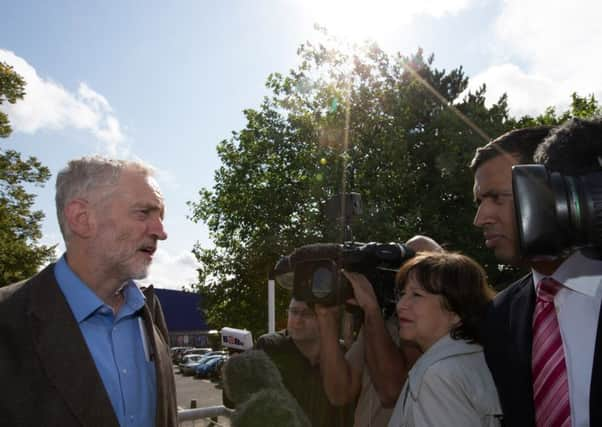Leaders: Labour election farce looks set to run


Yesterday Labour wiped 56,000 names off the list of those eligible to vote in the election that will decide who of Jeremy Corbyn, Yvette Cooper, Andy Burnham or Liz Kendall becomes party leader.
This was against a background of claims that the election has been hijacked by infiltrators from the right and hard left, who were keen to skew the contest to ensure a Corbyn victory.
Advertisement
Hide AdAdvertisement
Hide AdLabour officials scrutinising potential voters for evidence of “entryism” ruled 3,138 potential voters ineligible because it could be proved they were not party supporters. Of those 1,900 were members or supporters of the Green Party. Another 400 were Tories.
On the face of it this perhaps does not offer evidence of an orchestrated Conservative attempt to sabotage the process.
But with checks being carried out right up until the election on 10 September, the number is likely to go up. In any case, how exactly do Labour officials decide whether people are voting for the right reasons? Of greater concern, however, is the far higher number of names on the list of voters disqualified because they are not on the electoral register. This will only heighten suspicions that unscrupulous members of the public have attempted to take advantage of the system by creating multiple identities and registering to vote under assumed names.
Labour should have seen this problem coming when the decision to open up the vote was taken at a Special Conference overseen by Miliband before the general election.
Changing the rules to allow people to pay £3 to vote without becoming fully paid up members of the party created a system that was ripe for abuse. There are many within the party who are cursing Miliband for leaving such a chaotic legacy.
Meanwhile, as Labour tries to make the best of a bad job by saying that next month’s election is watertight, an increasingly cynical public is likely to think otherwise. Acting leader Harriet Harman argued that bringing the size of the leadership electorate down from 610,000 to 553,994 was a sign that Labour’s attempts to weed out imposters was bearing fruit.
Others, however, are likely to argue that having to remove such a large proportion of the names from voting lists shows just how badly the system has disintegrated. Whether Corbyn triumphs (as looks likely) or not, the election has become tainted and there will be those who dispute that it was a fair contest.
It is a road that could yet be paved with legal challenges and more controversy that distracts from holding the UK government to account.
Police merger raises Rankin’s ire
Advertisement
Hide AdAdvertisement
Hide AdIt IS fair to say that the Scottish Government’s merger of eight distinct police forces to form Police Scotland has not proved one of its more popular acts.
At the Edinburgh International Book Festival yesterday, a new voice joined the chorus of criticism.
Ian Rankin, of Inspector Rebus fame, lamented that his new thriller is out of date before it is even published as a result of the new force’s creation.
The man behind Edinburgh’s most famous literary detective complained that new murder investigation protocols introduced by Police Scotland have overtaken the activities of John Rebus and his colleague Siobhan Clarke, who are still operating as they would in the old Lothian and Borders force.
Speaking with officers for research purposes, Rankin said he asked them: “Don’t you guys ever think of all these Scottish crime writers? We’re doing our best for the economy and you’re scuppering us at every turn.”
Concerns about the way Police Scotland is being run are nothing if not wide ranging.
Among them are the routine arming of police officers, the proliferation of stop and search, the closure of police counters and the dreadful incident that saw a fatal car accident on the M9 ignored. The list is a long and worrying one.
Its extension to include the wrath of a crime writer, who prides himself in his firm grasp of the authentic, is perhaps less serious,
But it is hard not to imagine serving officers having a lot sympathy with Rankin’s crie de ceour. “Police Scotland – please, for God’s sake. Stop changing the rules. Just stop.”